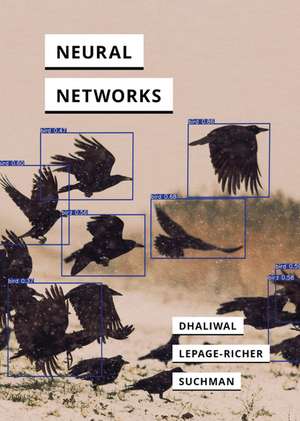Neural Networks: In Search of Media
Autor Ranjodh Singh Dhaliwal, Théo LePage-Richer, Lucy Suchmanen Limba Engleză Paperback – 9 apr 2024
A critical examination of the figure of the neural network as it mediates neuroscientific and computational discourses and technical practices
Neural Networks proposes to reconstruct situated practices, social histories, mediating techniques, and ontological assumptions that inform the computational project of the same name. If so-called machine learning comprises a statistical approach to pattern extraction, then neural networks can be defined as a biologically inspired model that relies on probabilistically weighted neuron-like units to identify such patterns. Far from signaling the ultimate convergence of human and machine intelligence, however, neural networks highlight the technologization of neurophysiology that characterizes virtually all strands of neuroscientific and AI research of the past century. Taking this traffic as its starting point, this volume explores how cognition came to be constructed as essentially computational in nature, to the point of underwriting a technologized view of human biology, psychology, and sociability, and how countermovements provide resources for thinking otherwise.
Neural Networks proposes to reconstruct situated practices, social histories, mediating techniques, and ontological assumptions that inform the computational project of the same name. If so-called machine learning comprises a statistical approach to pattern extraction, then neural networks can be defined as a biologically inspired model that relies on probabilistically weighted neuron-like units to identify such patterns. Far from signaling the ultimate convergence of human and machine intelligence, however, neural networks highlight the technologization of neurophysiology that characterizes virtually all strands of neuroscientific and AI research of the past century. Taking this traffic as its starting point, this volume explores how cognition came to be constructed as essentially computational in nature, to the point of underwriting a technologized view of human biology, psychology, and sociability, and how countermovements provide resources for thinking otherwise.
Preț: 104.39 lei
Preț vechi: 130.48 lei
-20% Nou
Puncte Express: 157
Preț estimativ în valută:
19.97€ • 21.77$ • 16.83£
19.97€ • 21.77$ • 16.83£
Carte indisponibilă temporar
Doresc să fiu notificat când acest titlu va fi disponibil:
Se trimite...
Preluare comenzi: 021 569.72.76
Specificații
ISBN-13: 9781517916695
ISBN-10: 1517916690
Pagini: 110
Dimensiuni: 127 x 178 x 10 mm
Greutate: 0.11 kg
Editura: University of Minnesota Press
Colecția Univ Of Minnesota Press
Seria In Search of Media
ISBN-10: 1517916690
Pagini: 110
Dimensiuni: 127 x 178 x 10 mm
Greutate: 0.11 kg
Editura: University of Minnesota Press
Colecția Univ Of Minnesota Press
Seria In Search of Media
Notă biografică
Ranjodh Singh Dhaliwal is Ruth and Paul Idzik Collegiate Chair in Digital Scholarship and assistant professor of English and film, television, and theater at the University of Notre Dame. His research—which spans media theory, science and technology studies, and literary criticism—has appeared in Critical Inquiry, Configurations, and Design Issues.
Théo Lepage-Richer is a UTM postdoctoral fellow in the Institute of Communication, Culture, Information, and Technology at the University of Toronto. His last piece on government organization and artificial intelligence was published in Big Data & Society.
Lucy Suchman is professor emerita in the anthropology of science and technology at Lancaster University, UK. Her most recent article on military imaginaries of AI-enabled warfighting was published in the journal Social Studies of Science.
Théo Lepage-Richer is a UTM postdoctoral fellow in the Institute of Communication, Culture, Information, and Technology at the University of Toronto. His last piece on government organization and artificial intelligence was published in Big Data & Society.
Lucy Suchman is professor emerita in the anthropology of science and technology at Lancaster University, UK. Her most recent article on military imaginaries of AI-enabled warfighting was published in the journal Social Studies of Science.
Recenzii
"Neural Networks is an elegant, compact book that renders visible the too-often naturalized equation of brain and computer. The authors illuminate the march of neural networks through colonial hierarchies, clinical psychiatry, and the present era of machine learning along with its parascientific mediations." —Beth Coleman, University of Toronto
"This multifaceted book reveals how neural networks today still play the ambivalent role of an almost mythological object, in between idealized visions of the brain and naturalized technology." —Matteo Pasquinelli, Ca’ Foscari University, Venice
"This multifaceted book reveals how neural networks today still play the ambivalent role of an almost mythological object, in between idealized visions of the brain and naturalized technology." —Matteo Pasquinelli, Ca’ Foscari University, Venice




